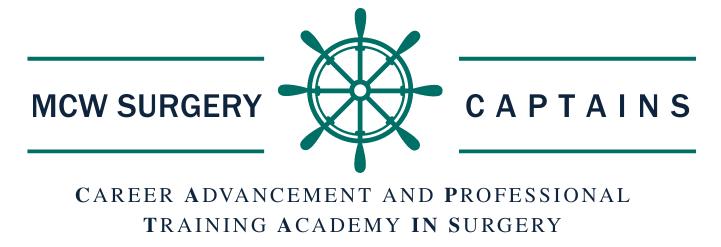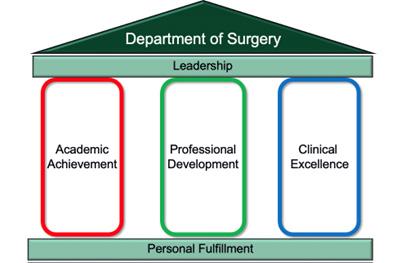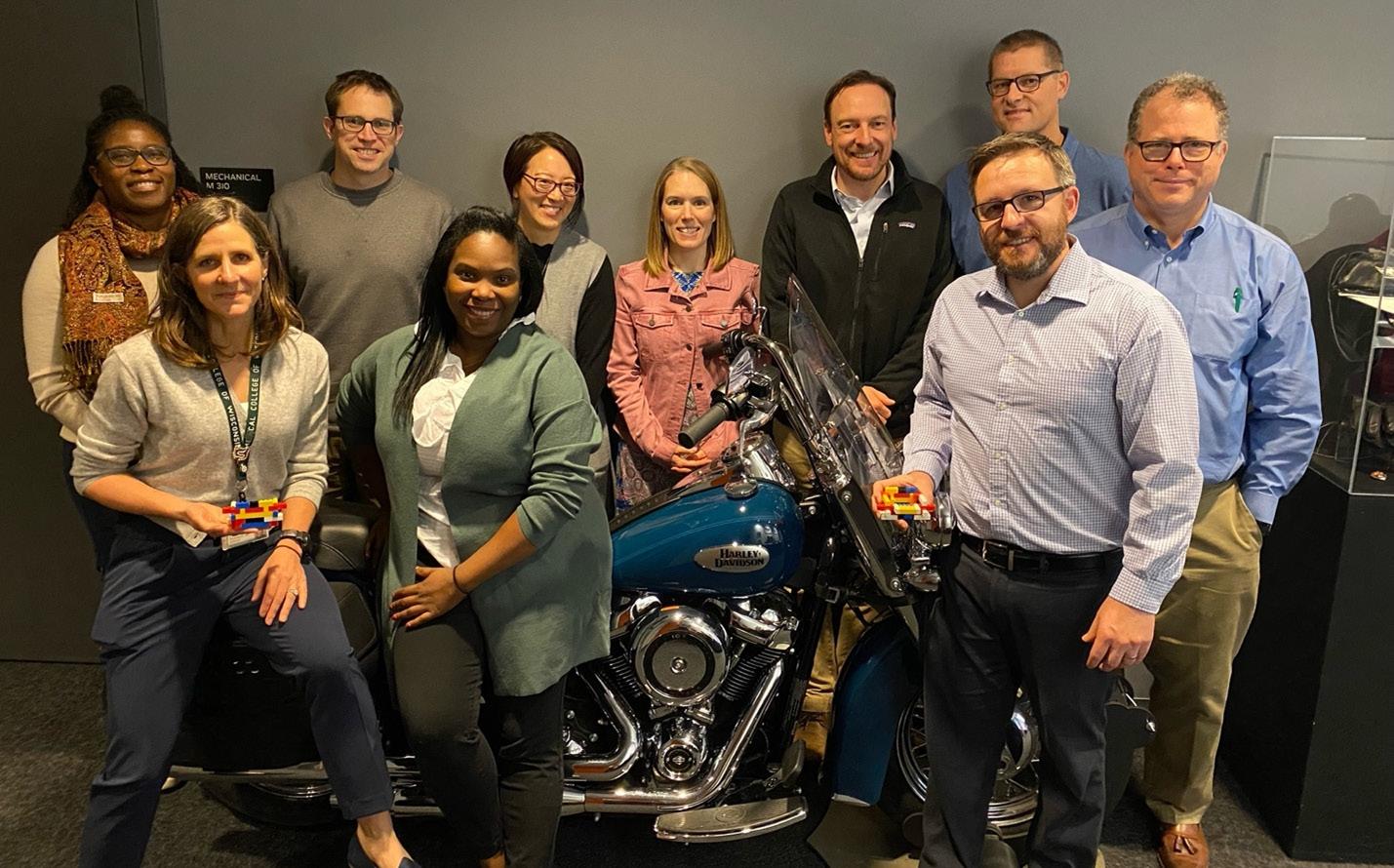
5 minute read
The MCW CAPTAINS (Career Advancement and Professional Training Academy IN Surgery)
Tracy S. Wang, MD, MPH
Leadership is an essential skill for physicians and surgeons. In a perspective piece on the key tenets of surgical leadership by the Society of Surgical Chairs, the three principles of collaboration and cooperativity, humanism and mentorship, and operational efficiency were emphasized.1 These skills are critical to surgeons at all stages of their career; in the setting of academic surgery, surgeons engage in team-based leadership roles in the operating room, in the multidisciplinary care of patients, in the education and mentorship of medical students, residents, and fellows, and in the leadership of centers, institutes and health systems.
There is a recognized need to develop leadership programs focused on the needs of practicing surgeons.2,3 However, opportunities to attend external leadership development programs can be challenging, given the financial costs of programs, time away from clinical practice, and personal/family obligations. Moreover, many leadership courses are attended by a single faculty member from a given institution, with a focus on the individual outside of the context of their work environment. Upon conclusion of a short-term course, it can be challenging for the individual to implement and obtain necessary feedback from their colleagues and institutional leadership on learned skills. Lastly, many leadership development programs require formal leadership roles as a condition of participation. These potential barriers to developing and nourishing a necessary and valuable skillset are perpetuated by the underrepresentation of women and minorities in leadership positions throughout academic medicine.

MCW Captains
The professional advancement of the faculty and the development of the next generation of surgical leaders is a core tenet of the Department of Surgery (Figure 1).
To further this commitment, last fall, the Department of Surgery launched the MCW CAPTAINS (Career Advancement and Professional Training Academy IN Surgery) program, an eight-session longitudinal program over the 2022 – 2023 academic year (Figure 2). For the inaugural year, 10 faculty members across 6 clinical divisions, with new and/or current leadership roles within the department and/or institution, were invited to participate:
• Callisia N. Clarke, MD, MS
• Christopher M. Dodgion, MD, MSPH, MBA
• Anuoluwapo F. Elegbede, MD, MS
• Andrew S. Kastenmeier, MD
• Joseph P. Hart, MD, MHL
• Caitlin R. Patten, MD
• Carrie Y. Peterson, MD, MS
• Timothy J. Ridolfi, MD, MS
• Kyle van Arendonk, MD, PhD
• Tracy S. Wang, MD, MPH

The customized curriculum was designed in partnership with FOCUS Training, Inc., a Milwaukee-based leadership development company. Based on their ELEVATE program, the strategic leadership skills emphasized in the four, bi-monthly ‘training days’ were adapted to the results of pre-assessment surveys taken by the participants, their Division Chiefs, and Douglas Evans, MD (Figure 3). These included: (1) prioritization and delegation; (2) effective feedback and accountability conversations; (3) enterprise leadership and personality types; and (4) leading through change and ambiguity.
Interspersed with these sessions were four half-day sessions in which departmental, institutional, and national leaders were invited to speak on topics that included department and institutional finances, Negotiations, and Difficult Conversations. Also included on these days were the FOCUS Training-led “Communities of Practice”, facilitated peer group sessions designed to apply the concepts from the previous month’s session to the work environment. Throughout the year, faculty members also participated in one small-group coaching session and one individual coaching session with the FOCUS Training facilitator.
The inaugural MCW CAPTAINS program culminated in a celebration of the participants and presentation to departmental leadership of the skills learned in the program. At the conclusion of the program, participants noted:
“I feel more mission-aligned with MCW and the hospital system.”
“Through reflection in the program and with the cohort, I learned a lot more about my own leadership styles and strengths. This has already impacted my daily practice.”
“This course allowed some time and space to reflect on my career, my leadership strengths, and opportunities for growth.”


MCW CAPTAINS: 2023 – 2024
A call for applications for MCW CAPTAINS for the 2023 – 2024 academic year occurred in the Spring of 2023. This year’s program is focused on early-career faculty (no more than two years since promotion to Associate Professor). The 21 applications were reviewed by a committee comprised of three departmental leaders and five participants from the 2022 – 2023 academic year. The 12 participants represent 7 divisions within the department and include two non-physician faculty members.
• Jed F. Calata, MD
• Chandler S. Cortina, MD, MS
• Sophie Y. Dream, MD
• Rana M. Higgins, MD
• Tammy L. Kindel, MD, PhD
• Anai N. Kothari, MD, MS
• Nathan W. Kugler, MD
• Paul L. Linsky, MD
• Angela J. Mathison, PhD
• Christina L. Megal, DNP, APNP
• Jacob R. Peschman, MD, MSPE
• Libby Schroeder, MD
For additional information on this topic, visit mcw.edu/surgery.
References
1. Rosengart TK, Kent KC, Bland KI, et al. Key tenets of effective surgery leadership: Perspectives from the Society of Surgical Chairs mentorship sessions. JAMA Surg 2016;151(8):768-770.
2. Jaffe GA, Pradarelli JC, Lemak CH, et al. Designing a leadership development program for surgeons. J Surg Res 2016;200(1):5358.
3. Gauly J, Court R, Currie G, et al. Advancing leadership in surgery; a realist review of interventions and strategies to promote evidence-based leadership in healthcare. Implement Sci 2023;18(1):15.








